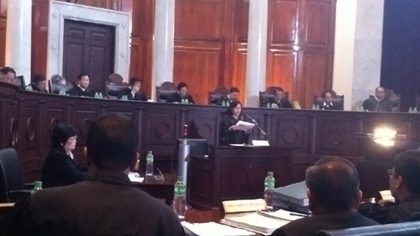SUMMARY
This is AI generated summarization, which may have errors. For context, always refer to the full article.

MANILA, Philippines – The Supreme Court will be holding a special session on Thursday, February 9, to act on petitions that could redefine the ongoing impeachment trial against Chief Justice Renato Corona. This is not uncharted territory for the High Court, however.
It has previously decided on impeachment-related battles. What makes the legal challenges now before the SC different is the unique set of circumstances surrounding the current impeachment trial.
In their special en banc on Thursday, the High Court is set to take up the following:
Corona’s petition asking the SC to stop impeachment proceedings:
The SC has previously intervened in the impeachment process. But in the 2 instances that they did, the process had not yet reached trial stage.
The SC ruled in 2003 that the impeachment complaint against then Chief Justice Hilario Davide was unconstitutional, saying only one complaint could be filed against the same impeachable official within a year.
Seven years later, in 2010, the SC also issued a TRO stopping the House from hearing the impeachment complaint against then Ombudsman Merceditas Gutierrez in 2010. The SC lifted it after 5 months, but Gutierrez eventually resigned in April 2011.
Now, the Senate, acting as an impeachment court, has already assumed jurisdiction over the impeachment proceedings. Pieces of evidence against Corona have already been presented, though, as the defense panel would insist, not accepted.
Presiding Office and Senate President Juan Ponce Enrile said that the SC could not stop the trial because the Senate – by acting as an impeachment court – is merely exercising its constitutionally-mandated duty.
There is one thread that connects all 3 impeachment cases though: they are rooted in the validity of the complaint.
In the case of Gutierrez and Davide, for example, the SC was asked to rule on the legality of a “second’ complaint filed against same impeachable official in one year.
In Corona’s case the defense said the complaint is void because it is not a verified complaint – meaning, they believe that not all the 188 lawmakers who signed it actually reviewed it.
PS bank asked the SC to enjoin the impeachment court from requiring them to disclose Corona’s foreign currency deposits:
The SC allowed in the 1997 Salvacion v. Central Bank of the Philippines case the inquiry into a foreign currency deposit. But PS bank said that the ruling does not apply to them, because the SC promulgated it given the “peculiar” circumstances of the case, where a rape victim sought damages from the offender. The SC ruled then that shielding the dollar deposit should not be given precedence over securing justice for the victim.
Corona’s petition asking for inhibition of Justices Antonio Carpio and Lourdes Sereno:
Lawyers Homobono Adaza and Alan Paguia sought the inhibition of the 2 justices in an earlier motion with the SC. They wanted the 2 to inhibit from Court deliberations on 5 pending petitions seeking a stop to the ongoing impeachment trial.
The grounds cited in the Adaza-Paguia motion are no different from the reasons raised by Corona in his petition filed with the High Tribunal on Wednesday, February 8. Both motions alleged that Carpio and Sereno have consistently taken positions opposite that of Corona’s.
Adaza and Paguia noted, for example, that the 2 Justices released summaries of their Statement of Assets, Liabilities and Net Worth in late December 2011, when Corona was battling criticism regarding his failure to disclose his.
The lawyers also said either Carpio or Sereno will likely replace Corona if the latter is convicted by the impeachment court.
Last February 7, however, both justices denied the Adaza-Paguia motion.
But would they also deny the motion of their own Chief? They will most likely make known their decision in the Thursday en banc. – Rappler.com
Add a comment
How does this make you feel?
There are no comments yet. Add your comment to start the conversation.